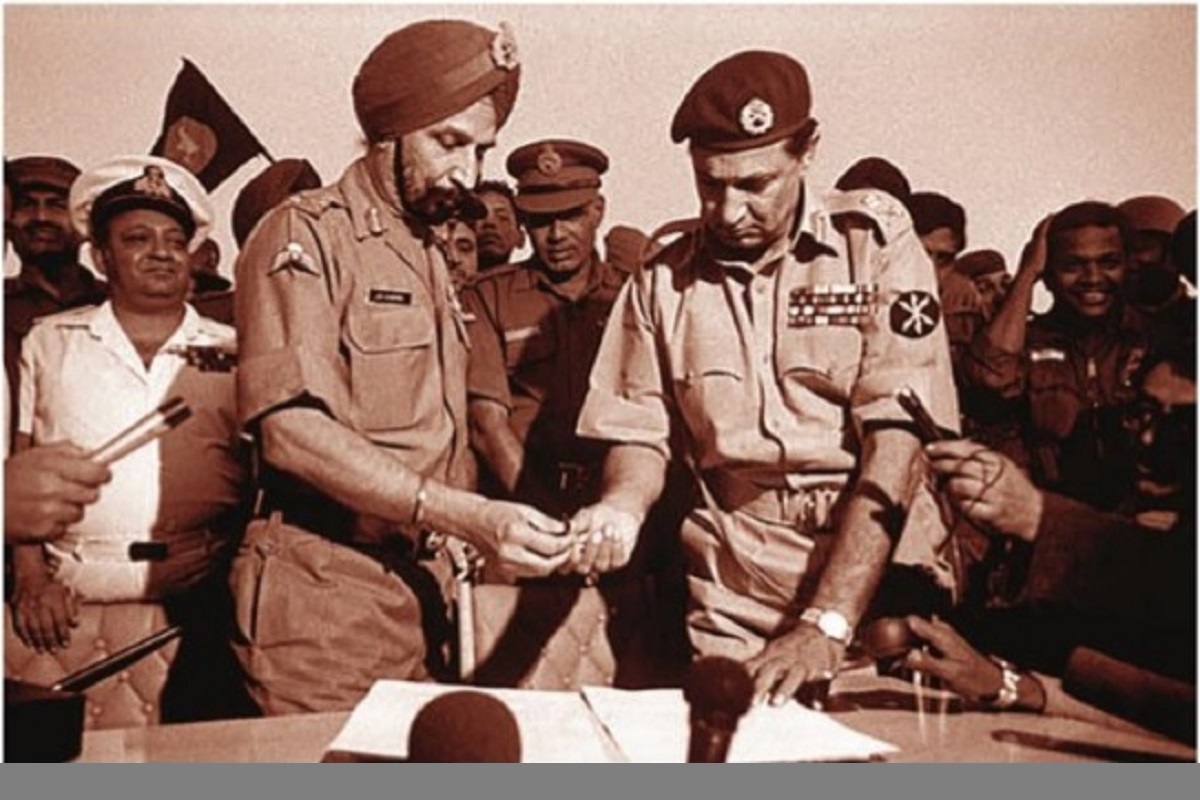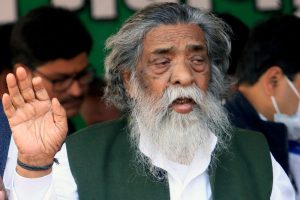The golden jubilee of the 1971 war has begun. The Swarmin Vijay Mashaal marking the start of celebrations is currently moving across the country, reminding people of the astounding victory achieved by the Indian armed forces. The Prime Minister gifted memorabilia to all surviving gallantry awardees of the war as a mark of respect for their service.
The celebrations would culminate on 16 December this year. Vijay Diwas will be jointly celebrated by the Indian Army and members of the Mukti Bahini as they fought the war as brothers in arms. As an appreciation to the Mukti Bahini, the Indian government honoured Col Quazi Sajjad Ali Zahir, a veteran of the war, with the Padma Shri this year. The war resulted in the creation of Bangladesh, to be visited by the Prime Minister this week to celebrate its 50th Independence Day on March 26.
Advertisement
Independence was declared by Sheikh Mujibur Rehman one day after the Pakistani army commenced its brutal crackdown, termed as Operation Searchlight, on the hapless citizens of then East Pakistan. This was worse than the genocide on Jews during the Second World War. It led to the killing of almost 3 million Bangladeshis and hundreds of thousands of rapes. The atrocities by Pakistani forces are well documented in the Liberation War Museum in Dhaka.
Over the past fifty years, Bangladesh-India relations have witnessed ups and downs; they are currently on an upswing, despite minor hiccups. Bangladesh’s economy has rebounded, while that of Pakistan, of which it was a part, is sinking. Economic collaboration with India has paid major dividends. The two nations have collaborated in every field, security being paramount. The support by Bangladesh in taming the North East insurgency is noteworthy.
An alternate connectivity between India’s North East and the Bay of Bengal, through Bangladesh, is almost a reality and will enhance the economies of both nations. The countries have resolved the enclave issue and India has supported Bangladesh with medical supplies and vaccines during the pandemic. Chinese attempts to push Indian influence away in the country has failed and relations between the two continue to grow.
Pakistan has repeatedly announced its desire to enhance ties with Bangladesh. In a recent interaction with the Pakistan High Commissioner to Bangladesh, the Pakistani President, Dr Arif Alvi, stated, “Pakistan highly values its ties with Bangladesh and wants to further expand cooperation by using the existing bilateral mechanisms.” The Pakistani High Commissioner was recalled for consultations to Islamabad, to avoid embarrassment, as Bangladesh is celebrating its Golden Jubilee from 17 to 27 March.
Heads of states from India, Nepal, Sri Lanka, Bhutan and Maldives have been invited to the celebrations. In Islamabad, celebrations in the Bangladesh High Commission would be attended by representatives of all nations except Pakistan as it has yet to accept its acts of genocide. Despite repeated demands by the Bangladesh government, Pakistan has refused to apologize for the brutal genocide in East Pakistan. On the contrary, Pakistan objected when Bangladesh, seeking to put the ghosts of 1971 at rest, began trials of members of the Jamaat-e-Islami, who had collaborated with the Pakistan army during the freedom struggle.
Pakistan claimed that these were counter to a tripartite agreement signed between Pakistan, India and Bangladesh in 1974. Pakistan’s objections infuriated the Bangladeshi leadership, which ignored their objections and refused to clear the appointment of the Pakistan High Commissioner. Pakistan also stated that Bangladesh was emboldened by Prime Minister Modi’s coming to power in India. These words worsened Pakistan-Bangladesh ties. India, on the other hand supported Bangladesh in its actions.
The Indian foreign office statement read, “India has been supportive of a judicial process under the International Crimes Tribunal of Bangladesh to address the pending issue of justice for war crimes committed during the movement for the independence of Bangladesh in 1971.” Bangladesh has formally requested the UN to declare 25 March as global genocide day in remembrance of the atrocities committed by Pakistan.
In March 2019, the Bangladesh permanent representative to the UN, Masud Bin Momen, while addressing a panel meet, stated, “it is unfortunate that a genocide of this scale has not been able to find its rightful place in the international genocide discourse at the UN. We are urging upon the UN for due recognition of our genocide in 1971.” He added, “The genocide of 25th of March is a black chapter not only in the history of Bangladesh but also of the history of the world.” It is evident that China is blocking this decision only to protect Pakistan.
However, the damage is pushing Pakistan-Bangladesh relations further away. Dawn newspaper in an article stated, “Pakistan and Bangladesh have multiple bilateral mechanisms, including foreign secretary-level consultations and Joint Economic Commission, but most have been suspended for years.” It added that foreign secretaries’ dialogue has not taken place for about 12 years.
Despite all Pakistan’s aims, if it seeks to normalize relations with Bangladesh, it must break protocol and apologise for its actions. Within Pakistan, the residents of Baluchistan, who have been vocal with similar charges of genocide, will find in Bangladesh’s accusations support for their lonely voice. Their protests across the globe and within Pakistan, which have been ignored, may now find favour.
The world has witnessed brutality of the Pakistan army once, and unless it acts, it would witness similar acts within Baluchistan. For the few Kashmiris, who have been harping on merger with Pakistan, this genocide is a grim reminder of how Pakistan tackles those whom it wishes to suppress. The attendance of Prime Minister Modi at the celebrations is another indication of growing IndoBangladesh ties and would remind the world of the support India gave to the country when it faced its worst moments.
No other nation, not even the US, intervened to support Bangladesh. India must also back Bangladesh’s demand in the UN to hold Pakistan accountable, compelling it to apologize, and 25 March must be designated as global genocide day.
(The writer is a retired Major-General of the Indian Army)











